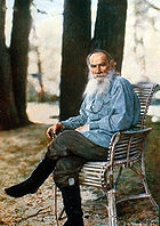
s and short stories
. Later in life, he also wrote plays and essay
s. His two most famous works, the novels War and Peace
and Anna Karenina
, are acknowledged as two of the greatest novels of all time and a pinnacle of realist fiction
. Many consider Tolstoy to have been one of the world's greatest novelists. Tolstoy is equally known for his complicated and paradoxical persona and for his extreme moralistic and ascetic views, which he adopted after a moral crisis and spiritual awakening in the 1870s
, after which he also became noted as a moral thinker and social reformer.
His literal interpretation of the ethical teachings of Jesus, centering on the Sermon on the Mount
, caused him in later life to become a fervent Christian anarchist
and anarcho-pacifist.
The hero of my tale, whom I love with all the power of my soul, whom I have tried to portray in all his beauty, who has been, is, and will be beautiful, is Truth.![]()
Error is the force that welds men together; truth is communicated to men only by deeds of truth.![]()
Ivan Ilych's life had been most simple and most ordinary and therefore most terrible.![]()
A man can live and be healthy without killing animals for food; therefore, if he eats meat, he participates in taking animal life merely for the sake of his appetite. And to act so is immoral.![]()
I sit on a man's back, choking him, and making him carry me, and yet assure myself and others that I am very sorry for him and wish to ease his lot by any means possible, except getting off his back.![]()
Six feet of land was all that he needed.![]()
The happiness of men consists in life. And life is in labor.![]()
The vocation of every man and woman is to serve other people.![]()

